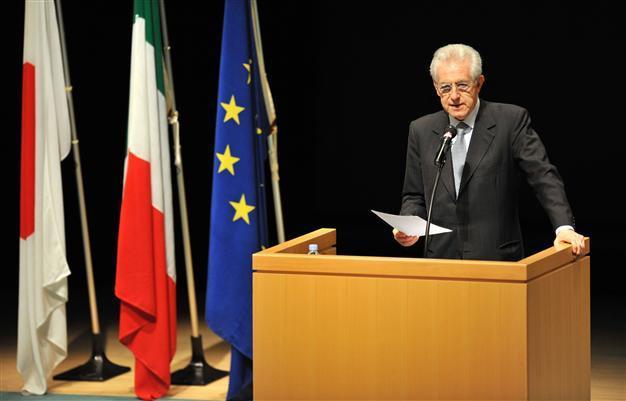Monti blames Germany, France for Euro debt crisis
TOKYO - Agence France-Presse

Italy's Prime Minister Mario Monti gives a lecture during his visit to Tokyo on March 28, 2012. AFP Photo
Italian Prime Minister Mario Monti today said the root of Europe's debt woes lay partly in the irresponsible parenting of Germany and France during the bloc's infancy.Monti told reporters in Tokyo that because the eurozone's two largest players had not abided by fiscal rules, they had set a bad example for the rest of the continent.
"The story goes back to 2003 (and) the still almost infant life of the euro," Monti said.
"It was in fact Germany and France that were loose concerning the public deficits and debts." The widely-respected technocrat, who replaced billionaire media magnate Silvio Berlusconi in November as head of the eurozone's third largest economy, said the flouting of rules allowing for an annual budget deficit of no more than three percent of GDP was the issue.
He said despite recommendations, a meeting of ministers from European Union governments had decided not to punish France and Germany for going beyond the deficit limit.
"So the two largest countries in the eurozone had the (deficit) with complicity of Italy, which was then chairing under the rotation system the council of prime ministers of European Union.
"Of course if the father and mother of the eurozone are violating the rules, you could not expect... (countries such as) Greece to be compliant." Monti, who was speaking during a visit to Japan, was a member of the European Commission in the early 2000s when it recommended sanctions be levied against countries that were running over-the-top deficits.
The European Council -- comprising elected politicians -- vetoed the move.
Monti's visit to Japan comes as Europe continues to stagger under the weight of runaway sovereign debt, with Greece at the forefront.
The eurozone is under pressure to boost the firepower of its debt rescue fund, with the 34-nation OECD on Tuesday pressing for a safety net of at least 1.0 trillion euros ($1.33 trillion).
Eurozone finance ministers are meeting on Friday and Saturday in Copenhagen to decide whether to increase the size of their debt rescue mechanism amid resurgent concerns about the financial health of Spain.
The OECD said the refinancing needs of vulnerable eurozone nations could top 1.0 trillion euros over the coming two years, on top of cash needed to recapitalise banks.
Italy alone needs some 750 billion euros to finance its debt, while Spain requires around 370 billion euros over the next three years.
Asked about the size of the hike in the eurozone firewall, Monti declined to give a specific figure but said: "I'm confident that the compact is solidly in place, the time for a conclusive and adequate decision on the firewalls has come." The premier, who was due to meet his Japanese counterpart later in the day, said he believed Europe now had a handle on its debt crisis and Italy was unlikely to suffer at the hands of the markets the way that Spain had.
"I think contagion (is) certainly not from Spain. Spain is I'm sure on a steady course of budgetary consolidation.
"And contagion as a whole I hope will soon belong to the past, now that more discipline is being adhered to by most member states and now that the firewalls are in the process of being fortified," he added.
The Copenhagen meeting will also focus on Spain's plans to rein in its public deficit to 5.3 percent of gross domestic product.
European leaders are concerned over Spain's deficit, fearing it may become the biggest victim of a eurozone debt crisis that has already driven Greece, Ireland and Portugal to accept international bailouts.
















